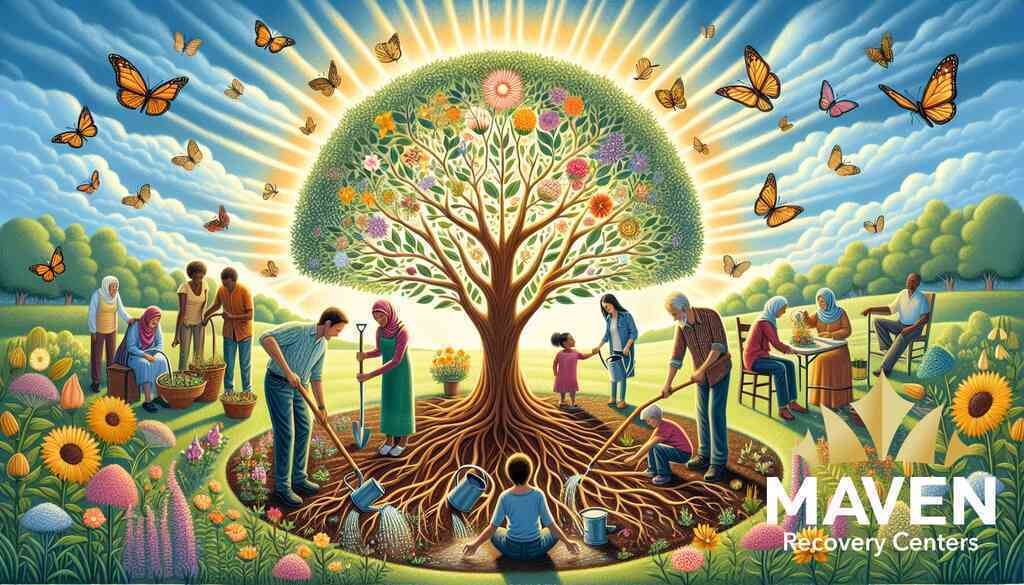
The Role of Family Support in Relapse Prevention by Maven
May 26, 2025
Connecting Hearts and Minds: The Essence of Family Support in Relapse Prevention
The Unseen Power of Family Involvement in Addiction Recovery
The often-overlooked strength of family involvement in addiction therapy plays a crucial role in the journey toward recovery. Families bring a unique form of emotional support in addiction recovery that can motivate and sustain an individual through the challenging phases of treatment. This involvement creates a continuum of care by extending therapeutic principles beyond the confines of treatment centers into everyday life. By actively participating, families help in mitigating loneliness and alienation that frequently accompany addiction, fostering an environment conducive to change and healing. Such involvement is a cornerstone for sustained recovery, aligning with Maven Recovery Centers’ mission to empower individuals and families.
Building Empathy and Understanding in the Recovery Journey
Empathy serves as a catalyst for building stronger familial connections during recovery. Families that engage in active listening and emotional attunement foster an environment where individuals feel safe to express their vulnerabilities. This creates a nurturing space crucial for trust-building in recovery, helping break down barriers often built through years of addiction struggles. When family members understand the complex emotions and thought patterns of their loved ones dealing with substance use, it decreases misunderstandings and enhances support. Empathy transforms the recovery process into a shared journey, promoting sustainable healing for everyone involved.
Exploring the Strength-Based Approach in Family Support
A strength-based approach in family support shifts the focus from deficits to potential and resilience. By highlighting existing capabilities, families can navigate the recovery journey with positivity and hope. This approach fosters confidence in both the individual and their family, facilitating a transformation that goes beyond managing symptoms to embracing holistic well-being. Maven Recovery Centers advocates for this approach as it not only helps in overcoming the immediate challenges of addiction but also empowers families to rebuild their lives on a foundation of resilience through family support. Through strength-oriented strategies, families reinforce the belief in their loved one’s ability to achieve long-term recovery.
The Architectural Foundation of Recovery: Rebuilding Trust and Communication
Rebuilding Trust as a Cornerstone in Relapse Prevention
Trust is paramount in the battle against substance use disorder. Rebuilding trust within family units plays a crucial role in relapse prevention, serving as an anchor for sustainable recovery. When trust is restored, families can provide a stable environment, crucial for individuals returning from the turbulence of addiction. This involves consistent honesty, transparency, and reliability, signaling growth and commitment to change. Family members must understand that rebuilding trust takes time and requires patience and mutual effort. Encouraging openness and fostering an environment devoid of judgment facilitates trust-building in recovery. By doing so, the individual battling addiction can feel secure and supported in their journey towards healing.
Effective Communication Strategies Within Families
Communication serves as the backbone of effective family support in addiction recovery. Families need to utilize effective communication strategies for relapse prevention. These strategies include active listening, expressing thoughts and feelings clearly, and fostering an environment where all voices are heard. Open dialogue can break down silos of misunderstanding and resentment that addiction often cultivates. By creating channels for honest communication, families can better navigate immediate and future challenges in recovery. This transparency not only aids the individual in recovery but also strengthens family bonds, offering emotional support for addiction and enhancing the collective resilience against relapse.
Navigating Boundaries and Co-dependency in Recovery
Managing co-dependency in addiction recovery is essential for healthy family support systems. Families must learn to establish healthy boundaries that respect the autonomy of the individual in recovery while providing necessary support and guidance. Co-dependency can often hinder recovery by enabling harmful behaviors. Educating family members about the signs of co-dependency and encouraging independence can mitigate this risk. Establishing and respecting boundaries helps in avoiding emotional exhaustion and resentment, allowing for a supportive environment driven by empathy rather than obligation. By effectively navigating these complex dynamics, families can foster a healthier, more sustainable recovery path for their loved ones.

Educating for Empowerment: Knowledge as a Tool for Family Support
Understanding Addiction Triggers and Relapse Warning Signs
Comprehending the dynamics of addiction is instrumental for families aiming to provide robust support to their loved ones. Recognizing and understanding addiction triggers is vital in anticipating potential challenges that may arise in the recovery process. Triggers can range from environmental cues to emotional states, often acting as precursors to relapse. Educating families on these aspects enhances their ability to foresee and mitigate risks, providing a supportive buffer for the individual in recovery. Additionally, knowing the relapse warning signs empowers families to act promptly, ensuring that preventive measures are effectively implemented. This comprehension transforms families into an active defensive mechanism, promoting a proactive stance in relapse prevention.
Educational Resources for Families of Addicts
Empowering families with knowledge can significantly strengthen the recovery process. Access to educational resources for families of addicts equips them with vital tools needed to navigate the complexities of substance abuse recovery. Maven Recovery Centers offer comprehensive guides and support materials tailored to various recovery stages. These resources not only arm families with practical strategies but also foster an understanding of the scientific and psychological facets of addiction. By leveraging these educational tools, families can become instrumental in creating a nurturing environment that underpins recovery and resilience. The knowledge gained helps dismantle misinformation and builds a fact-based understanding of addiction, ultimately enriching family support dynamics.
The Role of Family Education on Substance Abuse and Mental Health
Education plays a pivotal role in altering perceptions and enhancing empathy within family support systems. Understanding the intersection of substance abuse and mental health is crucial for families to provide informed support. Knowledge about how mental health influences addiction and vice versa can dramatically shift the familial approach towards more compassionate and effective support. Maven Recovery Centers emphasize the importance of family education programs that elucidate these connections, promoting a holistic view of the individual’s challenges. By fostering awareness and knowledge, families can better engage in mental health discussions, thus driving a more integrative and empathetic support process that is crucial for the long-term success of addiction recovery.
United in Purpose: Collaborative Pathways to Sustainable Recovery
Crafting Collaborative Recovery Plans with Loved Ones
Developing collaborative recovery plans with loved ones creates a unified front in the battle against addiction. This synergy promotes accountability, as all parties are invested in the recovery journey. It integrates the insights and experiences of family members, fostering a personalized approach that aligns with the individual’s unique circumstances. By engaging in open dialogue, families and individuals can anticipate obstacles and strategize on ways to overcome them effectively. This collaboration not only enhances the personal recovery experience but also fortifies family bonds, transforming the recovery process into a collective mission. For more insights into how this approach can be harnessed effectively, read more about collaborative recovery planning with families.
Engaging Families in Treatment and Relapse Prevention Programs
Engaging families in treatment and relapse prevention programs is essential for holistic recovery. Families who actively participate can provide continuous support even after formal treatment ends, bridging gaps in care and reducing relapse risks. Through education and involvement, family members become adept at recognizing early warning signs of relapse, providing timely interventions. These programs foster a comprehensive understanding of addiction dynamics, enabling families to offer support tailored to their loved one’s needs. This approach not only solidifies the individual’s commitment to sobriety but also empowers families to co-navigate the complexities of recovery, ultimately contributing to a sustainable recovery journey.
Family Dynamics and Healing Relationships During Recovery
The impact of family dynamics in recovery is profound, influencing both the pace and the quality of the recovery process. Healthy dynamics facilitate healing by reducing tension and fostering trust, which is crucial for long-term success. Addressing past conflicts and rebuilding these relationships requires patience and dedication from all family members. By focusing on effective communication and understanding, families can dismantle barriers erected by years of addiction-related stress. Programs offered at California addiction recovery centers specialize in healing these familial rifts, providing tools and strategies for continuous improvement. As families learn to navigate these dynamics, they not only enhance the recovery process but also lay the groundwork for enduring relationships, creating an environment conducive to lasting sobriety.

Beyond Sobriety: The Journey to Lasting Recovery and Renewed Bonds
The Power of Resilience and Family Support in Long-Term Recovery
Resilience through family support is a critical element in achieving and maintaining long-term recovery from addiction. Families often represent the fundamental pillar of strength, providing the necessary emotional and practical support to navigate the complexities of sobriety. This unwavering backing fosters an environment where individuals feel empowered to face challenges head-on, knowing that they are not alone in their journey. By leveraging this familial resilience, individuals can overcome setbacks and build a robust foundation for lasting recovery. Maven Recovery Centers emphasize how this strength drawn from family can be indispensable, transforming the recovery journey into one of growth and renewal.
Maintaining Sobriety Through Family-Driven Support Networks
Maintaining sobriety with family support emerges as a pivotal strategy in ensuring a sustainable recovery. Family-driven support networks act as a safety net, offering consistent encouragement and accountability, which are crucial in sustaining progress post-recovery. These networks provide an avenue for open dialogue, enabling individuals to express struggles and triumphs alike. By integrating family into the recovery process, individuals benefit from a collective strength that reinforces their commitment to sobriety. Such networks extend beyond immediate assistance, instituting a lifelong system of support integral to both maintaining sobriety and enriching family relationships. Maven Recovery Centers advocate for these networks as essential components in their sober living programs across California.
Rebuilding Family Bonds and Overcoming Addiction Stigma
Rebuilding family bonds post-addiction is crucial to ensuring a harmonious and supportive recovery environment. The journey to mending these relationships often requires patience, understanding, and a commitment to overcoming addiction stigma. Families must approach this healing process with openness, recognizing the past hurt while focusing on future possibilities. Overcoming stigma involves dispelling myths and embracing a more compassionate view of addiction, which strengthens familial ties and fosters acceptance. As families work together to dismantle these barriers, they create a more inclusive and supportive environment conducive to enduring recovery. Maven Recovery Centers provide guidance on nurturing these renewed bonds, emphasizing the transformative power of empathy and education in overcoming these challenges. For more information, explore their insights on overcoming addiction stigma.
Frequently Asked Questions
Question: How does family involvement in addiction recovery influence long-term success?
Answer: Family involvement in addiction recovery is pivotal for long-term success due to its profound impact on emotional support for addiction, trust rebuilding, and communication. At Maven Recovery Centers, we emphasize this aspect by integrating families into treatment plans, ensuring that they serve as a cornerstone of support. Families that are engaged can foster an environment filled with empathy and understanding, reducing relapse risks and encouraging sustained recovery. Learn more about Exploring the Role of Family Support in Addiction Therapy. By actively participating, families mitigate feelings of isolation that individuals facing addiction often experience. This cooperative approach, which aligns with our mission, not only empowers the individual but also strengthens familial bonds, paving the way for enduring recovery stages.
Question: Why is rebuilding trust important in the context of relapse prevention, and what role do families play?
Answer: Rebuilding trust is crucial in relapse prevention as it establishes a stable foundation for recovery. At Maven Recovery Centers, we stress that trust within families acts as an anchor, helping individuals feel secure and supported. Families can restore trust through consistent honesty, transparency, and patience, vital for creating a reliable recovery environment. This process not only signifies growth for the individual but also reiterates family commitment to change. Look into Family Support’s Impact on Relapse Prevention. By fostering open dialogue and avoiding judgment, families can facilitate a smoother transition towards sobriety. This supportive network acts as a reliable safeguard against relapse and reinforces the individual’s commitment to a sober lifestyle.
Question: What educational resources does Maven Recovery Centers offer to families of addicts to help them understand addiction triggers and cope with co-dependency?
Answer: Maven Recovery Centers provides an array of educational resources designed to equip families with the necessary tools to support their loved ones effectively. These resources cover essential topics, including understanding addiction triggers and managing co-dependency, crucial for maintaining sobriety through family support. Our guides and support materials offer practical strategies to recognize early warning signs and establish healthy boundaries in addiction recovery. By disseminating knowledge on these dynamics, families can better navigate challenges and bolster their collective resilience, ensuring a healthier recovery journey. Check out Essentials of Family Support Amidst Addiction Challenges. This informed approach nurtures a supportive environment conducive to long-term sobriety and well-being for everyone involved.
Question: How does the strength-based approach in family support benefit the recovery process?
Answer: A strength-based approach in family support, as advocated by Maven Recovery Centers, benefits the recovery process by shifting focus from deficiencies to inherent capabilities and resilience. This method empowers families to navigate recovery with positivity, celebrating each success and fostering hope. By highlighting the individual’s strengths, families help reinforce confidence, facilitating a transformation that goes beyond mere symptom management to embracing a holistic wellness approach. This mindset not only assists in overcoming immediate addiction-related challenges but also aids in rebuilding lives on a foundation of resilience, enabling sustained long-term recovery success.
Question: What is the significance of involving families in treatment and relapse prevention programs offered by Maven Recovery Centers?
Answer: At Maven Recovery Centers, we understand that involving families in treatment and relapse prevention programs is crucial for comprehensive recovery. Family participation extends the continuum of care beyond formal treatment, bridging potential gaps and reducing relapse risks significantly. Dive into Top Strategies for Long-Term Recovery in California. Through our programs, families learn to recognize early warning signs and implement timely interventions. This collaboration reinforces the family’s role as a reliable support system, aiding in maintaining sobriety and enhancing the individual’s commitment to recovery. By fostering a family-driven support network, we ensure that individuals are not only supported during treatment but also empowered to face future challenges collectively with their families.


